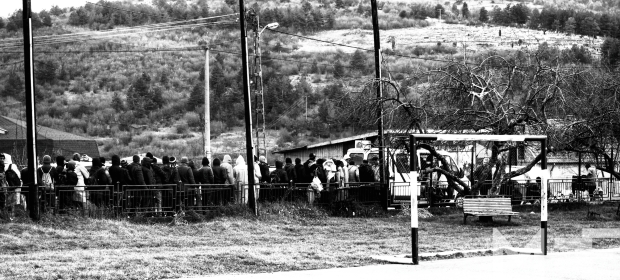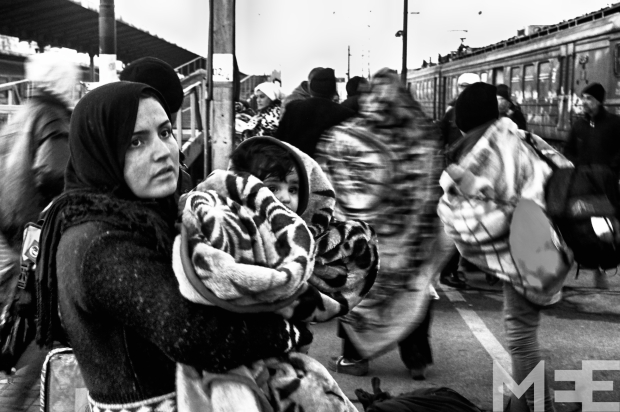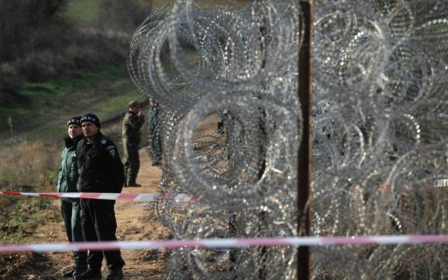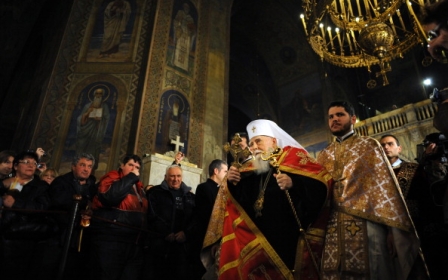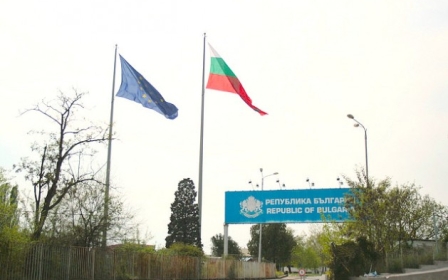Bulgaria: The forgotten Balkan migrant route
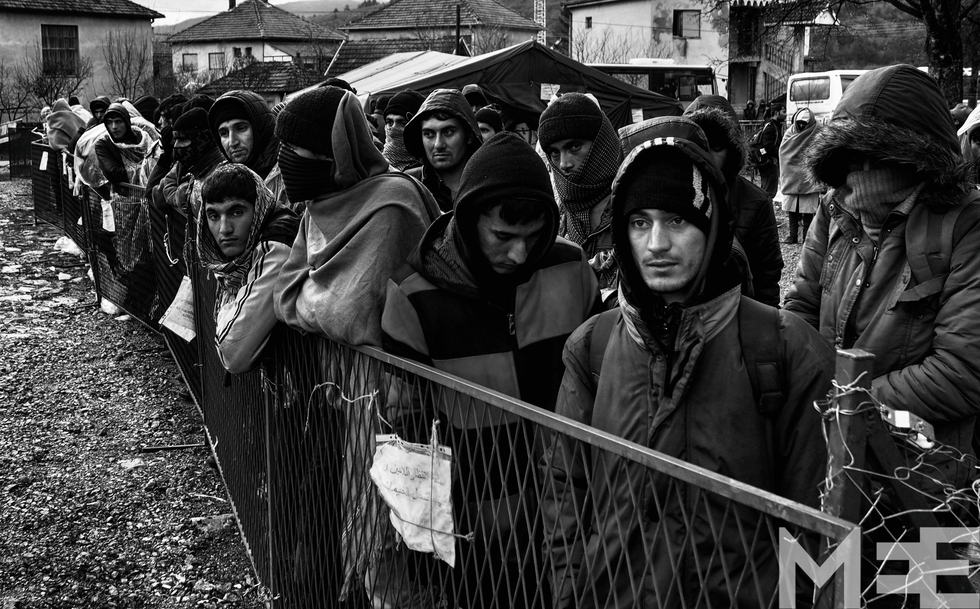
SOFIA / DIMITROVGRAD, Bulgaria - As thousands of refugees fleeing from the war are trying to reach European shores of the Aegean Sea, some of them have decided to try their luck and take the route through Bulgaria, although according to reports by humanitarian organisations that is no less a challenge than other routes to Europe.
This year, more than 27,000 refugees have been detained by the Bulgarian police, according to local media. The first officially documented victim of Afghan origin was killed at the Bulgarian-Turkish border in October when “a bullet ricocheted off” during the arrest of a group of 30 to 40 people who tried to enter the country.
Amnesty International urged the Bulgarian authorities to investigate this case and the case of the two Yazidis who died of hypothermia on the Turkish border after allegedly being pushed back and severely beaten by Bulgarian police. The investigation of the latter case was suspended because the authorities failed to identify the location of the incident.
Refugees do not only have problems entering Bulgaria; they also face difficulties leaving the country. They also face many obstacles in the camps where they wait to register and obtain refugee status.
Abdullah Nasser, 25, from Iraq said he had many problems while crossing into Bulgaria. He was arrested by the police when he entered the country, after which he spent 20 days in custody.
“The police took away my mobile phone and never gave it back. I could not contact my family during the stay in prison. They put us in prison, not in the camp, and if someone protested about conditions or treatment, they would be beaten. I paid 200 euros [$217] to be released and put in line for the registration of refugees,” said Nasser.
He later went to Serbia with two friends by a taxi arranged by a policeman, and paid a total of 100 euros for the transportation service. Nasser added that he spent a total of 1,000 euros in bribes to officials in Bulgaria and transport to Serbia.
Mohamed, 15, from Afghanistan said that he crossed Bulgaria without any problems only to be attacked by four policemen upon leaving the country when his group attempted to cross into Serbia.
“First they beat us with batons and then they released the dogs on us. A few people from the group had bites on their body, including me. They did not ask for documents or detain us. After that, they let us go,” said Mohamed.
He added that he did not file a complaint regarding this incident: “I don’t know to whom I could report what happened to us. After all, I don’t want to waste time, we still have a long way ahead.” He was on his way to Sweden where he wants to continue his education.
Evidence that Bulgaria still has a systemic problem concerning refugees is indicated in a statement by Nikolai Tchirpanliev, the former director of the State Agency for Refugees in Bulgaria, who said in an interview: “It is well known that Arabs have a tendency to lie. This is part of their ethnic group. This is how they live.”
However, the question remains whether the Bulgarian authorities could turn a blind eye on violations of human rights of refugees without the tacit permission of the EU. British Prime Minister David Cameron and German politician Horst Seehofer, minister-president of Bavaria, praised the behaviour of Bulgarian authorities during their visit to Bulgaria on 4 and 12 December, both stating that Bulgaria manages the borders of the European Union appropriately.
There was no mention of violation of human rights. Moreover, they expressed their intention to further support the country “in the important work that it performs for the EU". Cameron thinks that the EU should learn from Bulgaria how to protect borders: “They have got a sea border that they protect, they have got a land border with Turkey that they protect and I think there are real lessons to be learned here about [how] if you give it the priority you can get it done. So we should continue to support them with the important work they do,” The Guardian reported him saying.
During his visit to Sofia on 14 December, President of Greece Prokopis Pavlopoulos announced his country's support for Bulgaria joining the Schengen agreement, which allows passport-free border crossing across much of Europe, and praised their efforts to cope with the refugee crisis that has shaken Europe.
“It does not make sense that after complying with all the rules, [that] Bulgaria is still not taken to the Schengen accession,” Pavlopoulos said.
Humanitarian workers who have assisted refugees in the field have different views. Nikolina Milic, an activist with the Belgrade Centre for Human Rights, said refugees' rights are heavily violated in Bulgaria. She took part in gathering information from more than 100 refugees who reached Serbia through Bulgaria.
“We have reports on violations of the human rights of refugees, both at the border crossings and in the camps for their registration," she said. "According to the statements of refugees, police officers assaulted them physically and even opened fire at the groups with women and children.”
Based on the collected recent testimonies of refugees, the Belgrade Centre for Human Rights concluded that the situation in Bulgaria had worsened and that the country's authorities should urgently conduct thorough, independent and transparent investigations into these allegations.
“Bulgaria needs to strengthen the presence of preventive mechanisms against abuse in those places suspected of serious violations of human rights,” Milic said in a statement to Middle East Eye.
The Belgrade Centre for Human Rights forwarded the report to the UNHCR. The report also claimed that the refugees were looted in Bulgaria and sent back to Turkey, in violation of the law, which made it impossible for them to carry out procedures necessary to seek assylum.
The UNHCR in Serbia confirmed that they had received reports that are worrisome.
“Our partners in the field periodically submit reports that include allegations on violations of conventions protecting refugees. As we do not have the authority to act on these cases, we inform our colleagues in Bulgaria about these cases,” said Mirjana Milenkovski, the spokeswoman for UNHCR, Serbia.
She said that an additional problem is that many cases of human rights violations remain unregistered. “Most of the refugees do not want to talk about the problems, whether out of fear or simply because they are in a hurry. They just want to leave the camps as soon as possible and proceed towards their destination, sometimes even with serious injuries that require immediate medical care.”
Even so, after they leave Bulgaria and enter Serbia the refugees continue to have problems. According to many refugees’ statements, conditions in the refugee camp in Dimitrovgrad, across the border from Bulgaria, are below all criteria. The statements say that although the police in the camp are better than in Bulgaria, they too do not hesitate to use excessive force.
“One night, a policeman almost struck me with a baton. I told him in English, ‘Why do you want to beat me when I didn’t do anything? I'm just a man,’ and I lowered my hands to show that I'm not a threat. I was lucky and didn’t get beaten, although I saw that others were not as lucky as me,” said Mohammad Zai, 26, from Afghanistan, who is now in Germany. He added that there were a number of irregularities in the refugee camp in Dimitrovgrad, which was once a military border post.
“To leave the camp, we must go through the registration procedure, for which you wait for three, five or even more days. In the meantime, most people sleep on the wet, cold ground, as there is simply no accommodation for all of us. Every day, they give out numbers for the registration line, and if you don’t manage to register by the end of the day, the whole procedure starts all over again the next day - unless you pay 25 euros to the police officers. In that case, you can cut the line,” said Zai.
Intikhab Alam, 19, from Pakistan confirmed Zai’s allegations. “I saw some people giving money to police officers or humanitarian workers from the camp who passeed the money on to the police, just so they can get in the line to register. Me and the people with me, we don’t have money to pay, and that is why we are waiting. I hope that we will soon be able to pass,” said Alam.
He and his group left Tirah, on Pakistan's border with Afghanistan, to flee from the Taliban. However, they do not have “free” passage, and they must present themselves as Afghans. At the mention of Bulgaria, he shook his head in disappointment and said: “I hope that others will not take that route. They think we are animals and treat us as such. We don’t want anything from them, just to pass through.”
Kameran, 23, a Yazidi from Iraq, does not share their experience. With his family of five and on the way Germany, he said that he crossed Bulgaria by using GPS and without any help from humanitarian organisations.
“We walked through the woods for seven days. We were hiding because we heard what is happening in Bulgaria. We didn’t want to take any risks, so we didn’t even stop to buy food. We spent the supplies that we had - and we didn’t have a lot.”
He left the camp in Dimitrovgrad after eight hours of waiting for the registration. Families in this camp have priority for registration and on that day only three families arrived.
The refugees waiting for days to register sleep mostly on the ground under the open sky because the accommodation capacity is 32 beds in containers and about 50 beds in a tent without the flooring. Others sleep on plastic bags on the ground, and the only hot meal they get is from the volunteers of the "I'm Human" humanitarian organisation. A few weeks ago, the police denied them entry to the camp, so now they distribute soup and tea from a vehicle outside the camp.
In front of the camp at an improvised station, buses and taxis wait for the refugees. The police tolerate the work of transportation companies, which here operate semi-legally. They charge 25 euros for bus ticket to Belgrade, while taking a taxi varies between 200 and 250 euros. By comparison, taking the regular bus line to Belgrade, to which refugees are legally entitled upon receiving registration documents from the police, costs about 15 euros, and the train fair is about 9 euros.
Although humanitarian workers feel obliged to tell the refugees to take regular, cheaper transport, they whisper: “You don’t want to mess with these people [the local "drivers"/ thugs] - if they lose their profit, they become violent.”
For this reason, most refugees do not know that only two or three kilometers from the camp they can get a cheaper ticket at the regular bus or train station, especially when every euro means so much on their long journey. When this correspondent left Dimitrovgrad, he sat in a near-empty train in the company of two Afghans. They used the Internet and knew about the cheaper tickets, while others who have received appropriate papers wait in line for the expensive, semi-illegal bus in front of the camp and the police. Only at the city of Nis, further north, did the train become full to capacity with refugees coming from Presevo, bordering Macedonia. While they spoke of experiences different to those from fellow refugees who arrived via Bulgaria, they shared a common concern - to move quickly in case the EU closed its borders to them.
Middle East Eye propose une couverture et une analyse indépendantes et incomparables du Moyen-Orient, de l’Afrique du Nord et d’autres régions du monde. Pour en savoir plus sur la reprise de ce contenu et les frais qui s’appliquent, veuillez remplir ce formulaire [en anglais]. Pour en savoir plus sur MEE, cliquez ici [en anglais].


